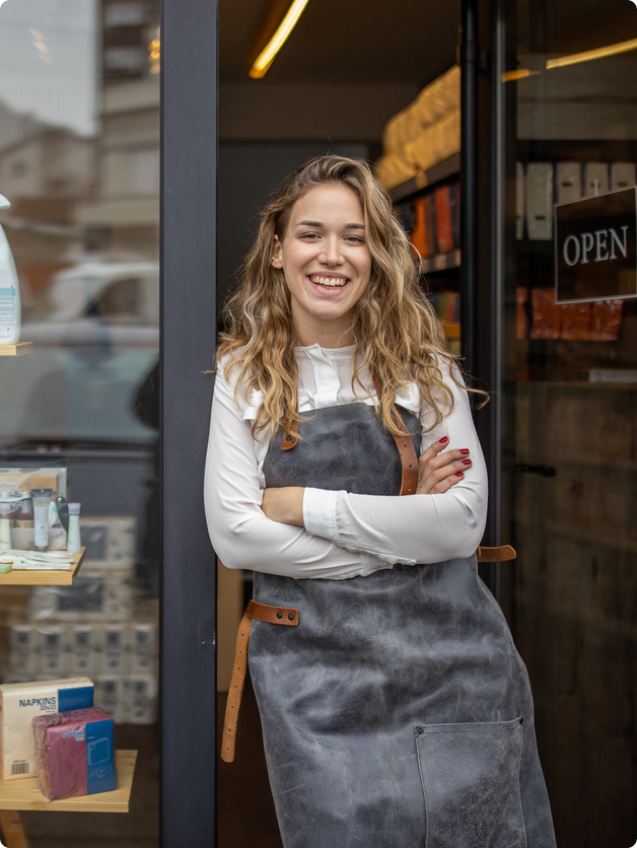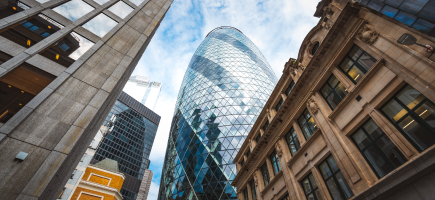Register your business for VAT with HMRC in 4 Simple Steps
Click on 'Get Now', enter the necessary details, proceed to checkout, and complete payment.
After payment confirmation, check your email for a more detailed form to complete.
We send your VAT application to HMRC through a government gateway account.
Your company VAT registration number and certificate will be sent to you by post to your principal place of business by HMRC.
Taxable turnover for the past 12 months exceeds £85,000. Your effective date for registration is the first day of the second month you exceed the threshold.
Is overseas with goods stored in the EU, and your total sales to customers in Northern Ireland is more than £85,000 a year.
Based outside the UK, selling goods to UK customers and then importing them (goods) into the UK
Turnover is below £85,000, but you want to reclaim the VAT on business expenses.
Deals with overseas sales, selling goods stored in the UK to UK clients, even though you do not have a business establishment in the UK.


Turnover is below £150,000 per year, and you want to simplify your VAT accounting by registering for the Flat Rate Scheme, which allows you to pay a flat rate VAT based on your business type.
Estimated annual turnover is £1.35 million or less, you’re up to date with your VAT returns, and you seek to register for the Annual Accounting Scheme or the Cash Accounting VAT to reduce your overall costs of making VAT payments.
Retail business sells goods to the public, and you intend to register for the VAT Retail Scheme.
Enterprise focuses on second-hand goods, works, art, collectables, or antiques.
WE GET IT!
Let us help you overcome these challenges because we know
You'll need to submit a significant amount of information and documentation, which are complex and time-consuming.
You may be an overseas enterprise and must register and understand multiple countries' VAT compliance laws.
Keeping up to date with the ever-changing VAT regulatory landscape is challenging.
Failing to comply with VAT requirements can result in penalties, fines, or legal action, which are expensive and take your focus off your main thing.

Streamlined Process
Our VAT registration service is fast, efficient, and straightforward. Once you provide us with the required information, our team of experts will handle the rest.

Expert guidance and personalised support
Receive personalised assistance and support designed to meet your unique needs, circumstances or requirements. Your assigned expert will help you through the registration process, including determining your eligibility and completing and submitting the VAT form. The expert can also help you determine and register for a suitable VAT scheme for your business.

Guaranteed Compliance with HMRC Requirements
VAT is a complicated tax. Work with us for VAT registration, and avoid making mistakes on your forms. Enjoy a smoother and faster process of obtaining your certificate of VAT registration and number from HMRC.

VAT (value-added tax) is a tax charged on most goods and services at every stage of production and distribution from manufacturer to retailer. Since it is a consumption tax, the end customer pays the VAT, while businesses in the supply chain collect and remit the tax to the HMRC (Her Majesty’s Revenue and Customs). Enrol for VAT as soon as you supply any goods or services to the UK or your business passes £85,000 in turnover.

Every business registered for VAT gets a unique identification number to identify the business and track its activities within the context of VAT. In the UK, the VAT number starts with the letters ‘GB’ (country code) followed by nine digits.

You must register for VAT if your business taxable turnover exceeds the threshold of £85,000 in 12 months or if you anticipate meeting this threshold within 30 days. However, businesses not meeting the threshold enjoy an ‘exception’ from the standard VAT rules. A VAT number UK is necessary for collecting and remitting the appropriate consumption tax to the HMRC.

The turnover VAT threshold for registration is the taxable turnover at which a business must register for tax in the UK. The threshold is calculated based on all taxable supplies a business makes, including selling company assets that have appreciated in value and not just sales of goods or services.

You can apply for your EORI number as part of the registration process (VAT) and get the number a few days after receiving the VAT number.

| Information required | Details |
|---|---|
| Declaration | A signature against a statement that the information you’ve provided in the form is accurate and complete to the best of your knowledge. |
| Business details | Name, type of business, address, date of incorporation, country of incorporation, and contact information. |
| VAT registration details | The business history, VAT history (if applicable), reasons for registration, turnover, VAT return periods, and business activities |
| Bank information | Bank name, address, sort code, Bank Identifier Code (BIC), business account name and number. |
| Additional information | Details of other tax the business is paying or any special VAT schemes the business intends to join. |
| Applicant details | Name, title, date of birth, national insurance number, home address, contact information and Unique Taxpayer Reference (UTR). |

If your business is a limited company, you must provide a Company Registration Number and a Corporation Tax Unique Taxpayer Reference (UTR) to complete the VAT registration process. Individuals and partnerships do not need a self-assessment UTR to register for VAT, but if they do have one, they must supply it.

The VAT registration threshold until March 2024 is £85,000. Businesses with a lower turnover may still voluntarily register for VAT online to enjoy benefits such as reclaiming VAT on expenses.
Which types of businesses do we help to register for VAT?We help a wide variety of companies successfully obtain their VAT number. Some of the businesses we support include–
And many others.

If your small business has a turnover (total sales and not profit) of more than the current VAT threshold of £85,000 per year, you must register and start charging VAT on your taxable supplies. You may opt for voluntary VAT registration if your annual turnover is below the threshold. However, remember that even if you are not registered, you may still need to pay for VAT (input VAT) on goods or services you purchase from VAT-registered companies.

No. You cannot run two businesses to avoid VAT taxes. HMRC investigates businesses suspected of splitting operations into multiple entities to avoid tax. If suspected, you expose yourself and your business to severe fines, penalties, charges or imprisonment. HMRC considers closely related businesses as one entity for the purpose of VAT. If the combined turnover of these businesses meets the registration threshold, you must register for the standard VAT scheme.

You can apply to HMRC for VAT cancellation when your business meets the following conditions —

Follow the steps below to deregister for VAT —
If you cannot cancel your registration online, you can complete and submit via post form VAT7. You can contact Your Company Formations for help in this regard.

There could be several reasons why your application is taking too long. Some of these reasons include;

From the first date of VAT registration, you are able to claim the VAT on goods or services purchased for business use and charge the appropriate VAT on goods or services you supply to your customers as a separate item on the invoice.

Remember, add VAT as a tax on the value of a product or service at each stage of production or distribution. The table below shows the different VAT rates that apply in the UK.
| Type of Good or Service | Applicable VAT Rate |
|---|---|
| Standard rate for most goods or services. | 20% |
| Reduced rate for commodities, which may include domestic fuel, energy-saving products, health products, books, and children's clothes | 5% |
| Zero-rated goods or services, including food items, prescription medication, motorcycle helmets, equipment for the disabled, among others | 0% |
| Exempt commodities including some financial, educational and medical services | n/a |

Zero-rated items are taxable at 0%, while VAT-exempt items are not subject to tax at all. You can also claim back VAT on zero-rated purchases but cannot reclaim VAT on exempt VAT purchases.
Once your business is VAT registered, you must charge the appropriate VAT on sales (output VAT), and you can also reclaim VAT on purchases (input VAT). At the end of your VAT period (usually every three months), add up all the output VAT you’ve charged and subtract all the input VAT you’ve paid. Then either pay HMRC the difference or they pay it.

Yes. You may choose to register VAT online even if your turnover is below the £85,000 threshold to enjoy the pros of applying for VAT. However, you must still follow the rules and submit VAT returns according to the required timelines.

Pros - benefits of VAT registration

HMRC designed the Flat Rate VAT scheme to make working out what you owe in VAT easier. Instead of calculating the VAT you owe based on each sale and purchase, you only pay a percentage (fixed percentage) of your turnover. HMRC sets the flat rate percentage by trade industry and sector.
For example, let's say the annual gross turnover of your travel agency is £100,000. Under the standard VAT scheme, you must calculate the VAT on every sale (output) and purchase (input) and pay the difference to HMRC. But with the flat rate scheme, you will pay the industry fixed rate of 10.5% of your annual turnover. If the agency were in the standard scheme, it would charge its customers the standard rate of 20%, which would be £100,000. But with the flat rate scheme, the agency would pay £10, 500.
However, the Flat Rate Scheme may not benefit all sorts of businesses. Call us at 0207 689 7888, and we will help you determine the best scheme for your business.

There are seven types of VAT schemes in the UK as follows —
| Name of Scheme | Description | Registration threshold | Point of Ineligibility |
|---|---|---|---|
| VAT Standard Scheme | The default VAT scheme for most businesses. Businesses charge VAT on sales and reclaim on purchases. Though it has a registration threshold, businesses with a turnover below it can still register voluntarily. | Annual VAT taxable turnover must be £85,000 or less. | None. |
| VAT Flat Rate Scheme | Businesses pay a fixed VAT rate based on sector. | Annual taxable turnover of less than £150,000. | Gross annual taxable turnover goes above £230,000. |
| VAT Annual Accounting Scheme | Businesses make advanced VAT payments throughout the year based on turnover estimates. | Annual taxable turnover is £1.35m or less. | Gross annual taxable turnover exceeds £1.6m, or actual VAT liability exceeds £2.3m. |
| Cash Accounting Scheme | Businesses account and make VAT payments for goods or services when the customer pays. | Annual taxable turnover is £1.35m or less. | Gross annual taxable turnover exceeds £1.6m. |
| VAT Retail Scheme | Retail businesses calculate VAT based on the difference between the buying and selling price of a good. They can also reclaim VAT on goods they have not been able to sell. | Retailers who sell goods to the public. | None. |
| VAT Margin Scheme | Pay 16.7% VAT on the difference between the buying and purchase prices of eligible goods. | Businesses that buy and sell second-hand goods, works of art, collectables or antiques. | None. |

Instead of completing a VAT return once every quarter, the Annual Accounting Scheme allows you to submit your VAT return annually if your turnover is less than £1.35m to be eligible for this scheme.
At the start of each year, HMRC will ask you to estimate how much VAT you expect to pay, and you may opt to work with the figure you paid VAT on the previous year’s VAT amount.
The business pays HMRC VAT based on an estimated annual liability in instalments. At the end of the year, the government expects you to submit a VAT return to HMRC and pay balances due or receive a refund for overpayment.

Yes. Since we began trading, we have helped thousands of businesses register for VAT, and our team is ready to answer any questions or concerns you have during and after you’ve registered. Our VAT services include —-

The way business register for VAT changed on 1 August 2022 with the rollout of HMRC's new VAT Registration Service (VRS) for limited companies.
Once your business is VAT registered, HMRC expects you to maintain digital records and file tax returns using compatible software. Making Tax Digital for VAT is an HRMC initiative that seeks to streamline their VAT reporting process, reduce reporting errors, and make it easier for businesses to manage and fulfil their tax obligations. Find records that must be kept digitally in compliance with MTD for VAT-registered businesses.
Our Customers Rate Our Corporate Services as Excellent on Trustpilot

Once again, thanks so much to the incredible Customer Service staff at Your Company Formations, Jinny and Shawn, for being so prompt about my filing deadlines.
Mishka Sibert, 45 minutes ago

The company's explanation videos and the sheer amount of relevant information made me choose them. A...
Ahmed Hassn, 54 minutes ago



We can provide free qualified guidance to help get youstarted with your business needs.

Only £29 Per Year
Registered Office Address
We offer a service that allows business owners the use of our prestigious address as if it were their own, and get official mail passed on to them hassle-free and confidentially without compromising their private residential address.
Read More
Only £98 Per Year
Business Trading Address
Our service allows you to receive your company’s correspondence at our central London location as if it were your own, giving the appearance of your business being based in the heart of the capital.
Read More
Only £29 Per Year
Director Service Address
Companies House legally require all directors of UK companies and partners of LLPs to register a directors business address for the public record.
Read More
Enter your company name to check availability
and view our packages